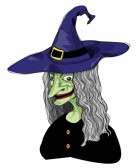She’s rude. She has no regard for my feelings—or anybody
else’s for that matter. When I see her looking my way, I cringe. I mean, my
stomach really curdles. I would
run in the opposite direction if I could. But there are times when she has me trapped,
backed into a corner. Those are the worst times. She’s mean, she’s ugly, she’s
got a HUGE rear end—and she hates me. The worst thing about her is that I find
myself facing her in the mirror every morning.
I am my own worst enemy, my toughest critic, and the least
supportive person in my life where my writing is concerned.
The same can be said for most writers I know. That’s not to
say that a part of me isn't still delusional, witlessly hoping to win a
Pulitzer prize or earn the title of New York Times Bestseller at some point.
But the truth is, when asked about my books or my writing, I struggle to find
anything positive to say. In fact, I recently did a radio interview to promote
my book. The kind host asked me to talk about Indigo, to get into the book and talk about the story. I opened my
mouth and began to blather on and on about a mythology class I took in college.
Why did I do that? Why did I practically change the subject instead of sing the
praises for a story I poured my heart and soul into, a book I really do like?
I love writing. There are times when imagination matches
energy and words spring forth with carefully controlled urgency and I find
myself glued to my keyboard, unable and unwilling to pull myself from my
constructed world. That’s where the magic is; those moments of writing flow are
what we ink slingers live for. But the rest of it? The rest of it is pretty
close to agony. In order to sell your work you must be able to sell yourself.
How can you sell yourself while there is a battle brewing inside your mind
between the writer and the critic? In a word: balance.
Mind over matter, is what my husband says. You have to take
control of both writer and critic and learn where and when to let each voice
emerge. To be a successful writer, you must cultivate both voices, temper them,
and learn where and when each is appropriate. For example, during the creative
phase of writing—you know, that point when you've outlined and storyboarded and
it’s time to add meat to the bones of your story—that’s when the writer voice
needs to emerge loud and strong. That other voice, the one nobody likes to
listen to, the critic—well, she needs to shut up. No, like really. Cover her
mouth with duct tape and hide her fat butt in a closet. That writer in you
needs to be set free without worry or concern.
On the other hand, when it’s time to edit—and I don’t care
who you are, you need to edit—tell the writer in you to go take a nap and let
the critic out of the closet. Despite all the ugly things I've said about the
critic, she’s not all bad. In fact, in
the right setting, she can become one of your greatest allies, allowing you to
polish your skills, accept constructive comments, and manage your expectations.
But that’s pretty much where her reign ends. Sooner or later
you’re going to have to find the energy and passion to sell your story. That’s
when the critic needs to be put away—far, far away. Book her a ticket on a
one-way cruise to somewhere icy and cold and perfect for witches like her. Am I
right?
The bottom line is this: Believe in yourself. Believe in
your talent. Trust your gut, paying attention to both the writer and critic in
you. And when you find yourself loathing the critic staring you in the mirror
every morning, take a break, take a breath, and then write her out of your next
chapter.
- How do you overcome the blues when you become your own worst critic?
 |
| BUY: AMAZON, B&N, INDIEBOUND |
INDIGO
Fiauna Lund
Seventeen-year-old Brit Kavanagh is hiding
something: Just before her mother disappeared, she gave Brit faery wings … sewn
into her skin.
When her father’s death forces Brit to leave the only home she’s ever known, danger follows her like a shadow. Catastrophe strikes again and again, and at every turn, she is confronted by the terrifying apparition of an otherworldly banshee.
Desperate to unravel the mysteries behind her wings and the curse of the banshee, Brit turns to Gentry O’Neill, a handsome stranger who knows more than he’s telling. With Gentry’s help, Brit pieces together her mother’s troubled past and discovers the horrifying truth of her own existence.
Her mother gave her wings, but she never meant for Brit to fly.
EXCERPT
 Fiauna Lund is a grown woman with an overactive imagination, a passion for writing, four children, and the dirty house to prove it.
Fiauna Lund is a grown woman with an overactive imagination, a passion for writing, four children, and the dirty house to prove it.
Reading and writing have always been passions for Fiauna. During her childhood she spent hours exploring the woods of rural western Pennsylvania where she first began creating stories about faeries, pixies, magic, and mystical creatures.
She met her husband, Aaron, while attending Utah State University, and later earned a degree in human services from Columbia College which allowed her to study the uniquely challenged and inspiring people who serve as her collective muse. She now resides in Farmington, Utah. When she's not reading, writing, or running, she spends her time caring for her four adorable children and two curious cats.
You can find Fiauna: Facebook, Goodreads, Website/Blog


